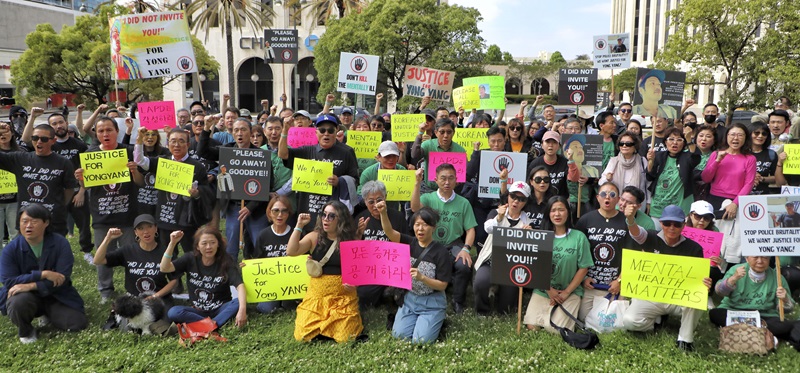At 2 p.m. on June 2, a rally was held at the Wilshire Lawn Plaza in Koreatown, LA, condemning the brutality of the Los Angeles Police Department. The gathering was in response to the tragic shooting of Yong Yang, who was killed by police officers who were called to help transport him to the hospital due to his mental illness. The family and citizens vehemently denounced the LAPD for this incident.
The rally, organized by the Justice for Yong Yang People’s Committee (JYYPC), saw participation from over 100 Korean-Americans, including David Kim (candidate for the 34th Congressional District), Grace Yoo (candidate for LA City Council District 10), and various community organizations such as the LA Caregivers Association and the Seoul National University Alumni Association USA. Other ethnic groups and church representatives, such as People’s City Council LA and the Church Without Walls, also joined to raise their voices together.
Eugene Harris, an African-American participant, stated, “This is not just an issue for the Korean community. It’s a tragedy that continues to occur daily within our Black community as well. When I first heard about Yong Yang’s death, it didn’t feel like someone else’s issue. This is something that could happen to anyone, which is why I’m here to raise my voice for our community.”

The attendees demanded improvements in how the police handle mentally ill individuals and called for restrictions on the excessive use of firearms. They expressed outrage that the police, whose duty is to protect innocent citizens, had shot Yong Yang merely for holding a knife, despite him posing no threat to others or committing any crime.
Participants held signs reading “Stop Killing, Start Helping,” “Condemn the Police,” and “LAPD Killed Our Brother,” calling for a reform of law enforcement policies.
Notably, Albert Corado, who lost his sister to a police shooting at a Trader Joe’s market in Silver Lake in July 2018, also spoke at the rally. Corado said, “The police keep killing people like this, but they don’t try to improve their policies or even express regret. They earn about $100,000 a year from the taxes of the very citizens they are supposed to protect, yet they fail to discern when to help and instead resort to shooting. The LAPD must improve its firearm use policies after this incident.”
Activist and Black church leader Stephen “Cue” Jin-Marie revisited the significance of the George Floyd incident, which occurred four years ago. Jin-Marie remarked, “Yong Yang’s case, like George Floyd’s, happened due to a broken police system. Our Black community shares this sentiment. The LAPD has always operated this way, and we must stop police violence.”
Unfortunately, the active participation of Korean-American politicians and organizations was noticeably absent in condemning the police for Yong Yang’s death. Despite the presence of other ethnic social activists, major Korean organizations like the Korean American Federation of Los Angeles (led by James An) and the Korean American Coalition did not attend. Current Korean-American politicians, including LA City Council Member John Lee (12th District), Orange County Congresswoman Michelle Steel, and LA County Congresswoman Young Kim, were also not present. Despite the organizers’ requests, no representatives from the Korean Consulate General in LA were present.
Even at Yong Yang’s funeral held at Forest Lawn in Hollywood on May 30, Korean-American politicians and organization leaders were absent. Although Yong Yang was a Korean national, the Korean Consulate General only observed the funeral rather than offering formal condolences.
A month after the incident, prominent Korean-American politicians have yet to speak out. They pledged during election campaigns to protect and represent Korean interests, but why have they remained silent on the unjust killing of Yong Yang by the police?
During the 1992 LA riots, the Korean community painfully felt the lack of political representation as their community was devastated. With the emergence of Korean-American politicians since 2020, it seemed that the community’s rights would be better protected, but that does not appear to be the case now.
Where are they when the Korean community needs them?
Min Yang, Yong Yang’s father, stated, “My son’s death does not end here. We will uncover the truth and seek justice.” The issue of excessive police violence is not just the problem of Yang’s family. It is a matter that the entire community, not just the Korean community, must address.
We hope for active involvement from Korean-American politicians.
By Mooyoung Lee lee.mooyoung@Koreadaily.com

![Korean President Yoon Suk Yeol just got ousted. What’s next? President Yoon Suk Yeol attends the opening session of the Ministerial Conference of the Third Summit for Democracy in March last year. The Constitutional Court upheld the National Assembly’s impeachment of Yoon, ousting him from office on April 4. [YONHAP]](https://www.koreadailyus.com/wp-content/uploads/2025/04/0404-Yoon-100x70.jpg)
![Korean President Yoon Suk Yeol ousted from office after unanimous Constitutional Court ruling President Yoon Suk Yeol, right, delivers his closing statement at the 11th and final hearing of his impeachment trial at the Constitutional Court in Jongno District, central Seoul, on Feb. 25. [CONSTITUTIONAL COURT]](https://www.koreadailyus.com/wp-content/uploads/2025/04/0403-impeach-100x70.jpg)
![Clovine accelerates global expansion in collaboration platform market Website of Clovine, a cloud-based project management provider [Screenshot]](https://www.koreadailyus.com/wp-content/uploads/2025/04/0403-clovine-100x70.jpg)
